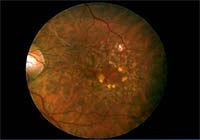What is Macular Degeneration?

The circular structure on the far left is the optic nerve. About one inch to the right of the optic nerve is the “macula” of the retina of this patient’s left eye. The white spots (called “drusen”) are deposits of metabolism of the retinal cells. The metabolism weakens as a process of aging and macular cells become damaged.
The macula is the part of the retina that is responsible for central fine vision. The retina is the part of the back of the eye that one sees with. Similar to the film in a camera, the retina receives the images that come through the “camera-like” lens. If the macula is damaged, the central part of the image is blocked. The images around the periphery of the image may be visible. Macular Degeneration is a damage to the macula that occurs in some people as a natural process of aging. There is nothing known that patients do to cause this condition. Some recent studies have shown some benefit with the use of antioxidant vitamins. See your physician before taking any medication. Since macular degeneration preserves peripheral or side vision, macular degeneration alone never causes total blindness. However, it can make reading or close work difficult or impossible without the use of special low vision aids.
Causes and Symptoms
The most common form of macular degeneration is called “dry type”. This is associated with aging. It is caused by a breakdown of the tissues of the macula. Approximately 10% of macular degeneration is called exudative or “wet” type. In this case, small blood vessels begin to grow abnormally behind the retina often leading to scarring and reduced vision. While the “dry” type often produces symptoms gradually over many years, the “wet” type can produce a sudden onset. These blood vessels are very delicate and leak into the retina. Sometimes a laser beam is used to seal off the leaking blood vessels. A dye test, called a fluorescein angiogram, is used to identify the exact location of the leakage. This treatment is only done in the very early stages of the condition. The hope is that laser will reduce further loss of vision by preventing progressive scarring.

The macula controls the central fine vision. With macular degeneration, a blurred or crooked central part of a page may be seen by the patient.
Low Vision Aids
Low vision optical aids often improve vision for people with macular degeneration. Many different types of magnifying devices are available. Spectacles, hand or stand magnifiers, telescopes, and closed circuit television for viewing objects are some of the available resources. Bright illumination with special lamps can be helpful as well as books, newspapers, and other items in large print. Books on tape are available from the state library in Salem. Also, local service from the Oregon Commission for the Blind on Willamette street is available.
Age Related Eye Disease Study (AREDS)
Vitamin & Mineral Supplements and Your Eyes
Scientists have long debated whether taking vitamin and/or mineral supplements could help prevent, treat or cure certain eye conditions. Some early scientific studies seemed to show that supplements had the potential to prevent or slow the progression of cataract and age-related macular degeneration (AMD), although more complete study was needed to answer some important questions:
- Which supplements are helpful for which condition(s)?
- Which patients will benefit from supplementation?
- What doses of supplements would benefit patients?
- What other effects might these supplements have on the body?
A recent study, the Age-Related Eye Disease Study (AREDS), sought to address these questions, and seems to have given us some (but not all) of the answers to these questions.
What is AREDS?
The Age-Related Eye Disease Study (AREDS) is a major study sponsored by the National Eye Institute (NEI), one of the Federal government’s National Institutes of Health, and conducted at 11 major medical center research facilities around the country.
In the study, scientists looked at the effects of zinc and antioxidants, and a combination of both, on patients with cataracts, and on those with varying stages and types of age-related macular degeneration (AMD). They also studied patients without evidence of cataract or AMD to determine if zinc and/or antioxidants can prevent the development of these conditions.
What Were the Results?
The study showed a number of important things:
High levels of antioxidants and zinc can reduce the risk of vision loss from advanced AMD by about 19% in high-risk patients (patients with intermediate AMD or advanced AMD in one eye but not the other).
- Supplements do not provide significant benefit to patients with minimal AMD.
- These nutritional supplements do not prevent the initial development of AMD, nor do they improve vision already lost to AMD.
- Nutritional supplements do not seem to prevent cataracts, or to keep them from getting worse over time.
- While most patients in the study experienced no serious side effects from the doses of zinc and antioxidants used, a few taking zinc alone had urinary tract problems that required hospitalization. Some patients taking large doses of antioxidants experienced some yellowing of the skin. The long-term effects of taking large doses of these supplements are still unknown.
Should I Take Nutritional Supplements?
If you have intermediate (or advanced AMD in one eye only), talk to your physician about taking nutritional supplements. He or she can help you determine if they may be beneficial (and safe) for you, and what types and doses of supplements to take. The doses used in the study were:
- Vitamin C 500 mg
- Vitamin E 400 IU
- Beta-carotene 15 mg or 25000 IU
- Zinc 80 mg, as zinc oxide
- Copper 2 mg, as cupric oxide (copper should be taken with zinc, because high-dose zinc is associated with copper deficiency.)
It is very important to talk with your physician before taking large-dose supplements, and to follow his or her dosage recommendations carefully. Some supplements may interfere with each other or other medications.
Smokers and ex-smokers probably should not take beta-carotene, as studies have shown a link between beta-carotene use and lung cancer among smokers.
Where Can I Get More Information?
More information on AREDS is available from the National Eye Institute of the National Institutes of Health website link: Age Related Eye Disease Study (AREDS) National Eye Institute.
Your eye physician is your best source of information about eye care. You can also get trustworthy information from the American Academy of Ophthalmology’s partner Web site, Medem, www.medem.com/MedLB/bufferpage_aao.cfm.
AmericanAcademy of Ophthalmology
October 2001